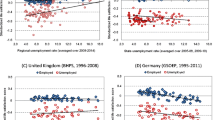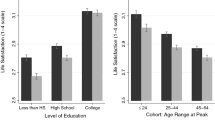Abstract
Are certain groups of unemployed individuals hurt less by unemployment than others? This paper is an attempt to test the hypothesis that non-pecuniary costs of unemployment may vary between societies with different unemployment rates. Using cross-sectional data from the SALDRU93 survey, I show that households’ perceptions of life satisfaction are inversely related to household unemployment for South Africa as to be expected in richer countries. Reported well-being levels are shown to be associated negatively with others’ unemployment at the geographical cluster level for the employed. However, unemployment appears to hurt less for the household if unemployment rates in the local labour market are high.
Similar content being viewed by others
References
Akerlof G. (1980). A theory of social custom, of which unemployment may be one consequence. Quarterly Journal of Economics 94(4): 749–775
Blanchflower D.G. and Oswald A.J. (2004). Well-being over time in Britain and the USA. Journal of Public Economics 88: 1359–1386
Clark A.E. (2003). Unemployment as a social norm: psychological evidence from panel data. Journal of Labor Economics 21: 323–351
Clark A.E. and Oswald A.J. (1994). Unhappiness and unemployment. Economic Journal 104: 648–659
Darity W. and Goldsmith A.H. (1996). Social psychology, unemployment and macroeconomics. Journal of Economic Perspectives 10(1): 121–140
Di Tella R., Macculloch R.J. and Oswald A.J. (2003). The macroeconomics of happiness. Review of Economics and Statistics 85: 809–827
Easterlin R.E. (1974). Does economic growth improve the human lot? Some empirical evidence. In: David, P.A. and Reder, M.W. (eds) Nations and Households in Economic Growth: Essays in Honour of Moses Abramowitz, pp. Academic Press, New York and London
Easterlin R.E. (1995). Will raising the income of all increase the happiness of all?. Journal of Economic Behaviour and Organization 27: 35–47
Frey B. and Stutzer A. (2000). Happiness, economics and institutions. Economic Journal 110: 918–938
Fryer D. and Payne R. (1986). Being unemployed: a review of literature on the psychological experience of unemployment. In: Cooper, C.L. and Robertson, I. (eds) International Review of Industrial and Organizational Psychology, pp 235–278. Wiley, London
Gerdtham U.G. and Johannesson M. (2001). The relationship between happiness, health and socio-economic factors: results based on Swedish micro data. Journal of Socio-Economics 30: 553–557
Graham C. and Pettinato S. (2001). Happiness, markets and democracy: Latin America in comparative perspective. Journal of Happiness Studies 3: 237–268
Jackson P.R. and Warr P. (1987). Mental health of unemployed men in different parts of England and Wales. British Medical Journal 295(6): 525
Kingdon G. and Knight J.B. (2004). Unemployment in South Africa: the nature of the beast. World Development 32(3): 391–408
Kingdon, G. and J.B. Knight: 2003, Well-Being Poverty Versus Income Poverty and Capabilities Poverty? (Centre for the Study of African Economies, University of Oxford), manuscript
Klasen S. (1997). Poverty, inequality and depravation in South Africa: an analysis of the 1993 SALDRU survey. Social Indicators Research 41: 51–94
Lelkes O. (2002). Tasting Freedom: Happiness, Religion and Economic Transition. Centre for Analysis of Social Exclusion, London School of Economics
Moller V. (1998). Quality of life in South Africa: post-apartheid trends. Social Indicators Research 43: 27–68
Moulton B.R. (1990). An illustration of a pitfall in estimating the effects of aggregate variables on micro units. Review of Economics and Statistics 72: 334–338
Namazie C. and Sanfey P. (2001). Happiness and transition: the case of Kyrgzstan. Review of Development Economics 5: 392–405
Oswald A.J. (1997). Happiness and economic performance. Economic Journal 107: 1815–1831
Platt S. and Kreitman N. (1990). Long term trends in parasuicide and unemployment in Edinburgh, 1968–87. Social Psychiatry and Psychiatric Epidemiology 25(1): 56–61
Platt S., Miccolo R. and Tansella M. (1992). Suicide and unemployment in Italy: description, analysis and interpretation of recent trends. Social Science and Medicine 34(11): 1191–1201
Theodossiou I. (1998). The effects of low pay and unemployment on psychological well-being: a logistic regression approach. Journal of Health Economics 17: 85–104
Winkelmann L. and Winkelmann R. (1998). Why are the unemployed so unhappy?. Economica 65(257): 1–157
Author information
Authors and Affiliations
Corresponding author
Rights and permissions
About this article
Cite this article
Powdthavee, N. Are there Geographical Variations in the Psychological Cost of Unemployment in South Africa?. Soc Indic Res 80, 629–652 (2007). https://doi.org/10.1007/s11205-006-0013-z
Accepted:
Published:
Issue Date:
DOI: https://doi.org/10.1007/s11205-006-0013-z




